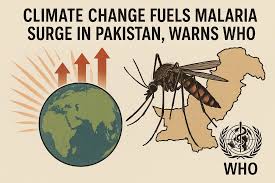The World Health Organization (WHO) and health authorities in Pakistan have issued a stark warning: climate change is accelerating the spread of malaria, putting millions of lives at greater risk. With over 2 million malaria cases reported annually, the disease has become a growing public health crisis, particularly in flood-affected and low-lying areas.
How Climate Change Is Fueling the Spread of Malaria in Pakistan
Pakistan’s increasingly unstable climate marked by heavier rainfall, rising temperatures, and prolonged flooding has created ideal conditions for mosquito breeding. The Anopheles mosquito, which transmits malaria, thrives in stagnant water and warmer climates, allowing the disease to spread faster and wider than before.
Key climate factors contributing to the surge include:
- Intense and prolonged monsoon seasons
- Frequent urban and rural flooding
- Rising temperatures extending mosquito lifespans
- Altered breeding cycles due to humidity and rainfall
Regions Most Affected by Malaria Outbreaks
While malaria is a national concern, certain areas have been hit the hardest:
- Flood-prone regions in Sindh and Balochistan
- Densely populated rural areas with poor drainage systems
- Internally displaced communities with limited healthcare access
These vulnerable populations face increased risk due to lack of prevention, delayed treatment, and minimal infrastructure to manage disease outbreaks.
Urgent Response Needed to Prevent Further Spread
WHO and Pakistan’s health agencies are urging a multi-level response to prevent malaria from becoming an uncontrollable epidemic:
- Strengthen early diagnosis and access to antimalarial treatments
- Distribute mosquito nets and conduct indoor spraying in high-risk zones
- Invest in climate-resilient public health infrastructure
- Launch awareness campaigns targeting vulnerable communities
- Improve disease surveillance and mosquito control programs
What You Can Do to Help Prevent Malaria
Individual action remains critical in the fight against malaria. Citizens are encouraged to:
- Use insecticide-treated bed nets, especially in rural or flood-hit areas
- Eliminate stagnant water around homes to reduce mosquito breeding
- Wear protective clothing and use repellents during peak mosquito hours
- Seek prompt medical treatment for fever and flu-like symptoms
The Urgent Message from WHO and Pakistan
With 2 million malaria cases each year, climate change is no longer just an environmental issue it’s a health emergency. If left unchecked, malaria will continue to strain Pakistan’s already burdened healthcare system and endanger vulnerable communities.
Now is the time to act. Integrated climate and health strategies are essential to protect lives and control the growing malaria threat across the country.



Comments (0)
No comments yet. Be the first to comment!
Leave a Comment